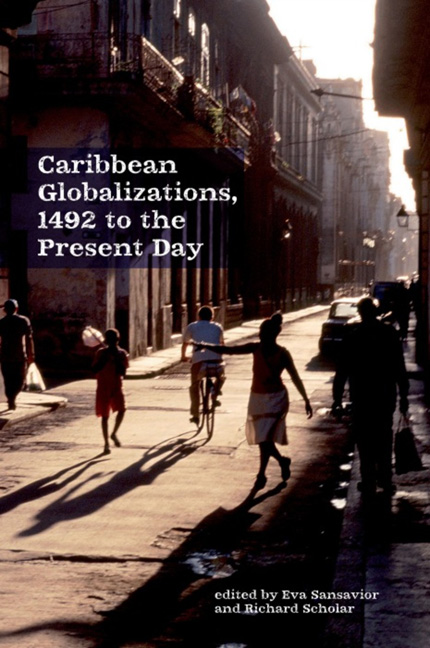Book contents
- Frontmatter
- Contents
- Contributors
- Prologue: Globalization, Globality, Globe-Stone
- Introduction
- I Globalizations in the Making
- II The Complex Present
- 6 Tobacco: The Commodification of the Caribbean and the Origins of Globalization
- 7 The Amaranth Paradigm: Amerindian Indigenous Glocality in the Caribbean
- 8 Aluminium: Globalizing Caribbean Mobilities, Caribbeanizing Global Mobilities
- 9 Race and Modernity in Hispaniola: Tropical Matters and Development Perspectives
- 10 Local, National, Regional, Global: Glissant and the Postcolonial Manifesto
- 11 Tropical Apocalypse: Globalization and the Caribbean End Times
- Acknowledgements
- Index
10 - Local, National, Regional, Global: Glissant and the Postcolonial Manifesto
from II - The Complex Present
- Frontmatter
- Contents
- Contributors
- Prologue: Globalization, Globality, Globe-Stone
- Introduction
- I Globalizations in the Making
- II The Complex Present
- 6 Tobacco: The Commodification of the Caribbean and the Origins of Globalization
- 7 The Amaranth Paradigm: Amerindian Indigenous Glocality in the Caribbean
- 8 Aluminium: Globalizing Caribbean Mobilities, Caribbeanizing Global Mobilities
- 9 Race and Modernity in Hispaniola: Tropical Matters and Development Perspectives
- 10 Local, National, Regional, Global: Glissant and the Postcolonial Manifesto
- 11 Tropical Apocalypse: Globalization and the Caribbean End Times
- Acknowledgements
- Index
Summary
On 16 March 2007, the ‘manifeste pour une littérature-monde en français’ appeared (appropriately given the title of the newspaper) in Le Monde des livres. This literary manifesto was largely the result of collaborative conversations between its four principal signatories, Alain Mabanckou, Michel Le Bris, Jean Rouaud, and Abdourahman Waberi, but was also endorsed by a further forty-one authors from throughout the French-speaking world. The document, although heavily criticized immediately on its publication, has proved to be the most prominent of a number of literary manifestos published in French in recent years. Several Caribbean signatories, from Guadeloupe, Haiti, and Martinique, associated themselves with the manifesto, and, as such, the document continues the important work of the Étonnants voyageurs festival, in Saint Malo as well as in satellite locations such as Port-au-Prince, of supporting Caribbean literature in French and of bringing it to the attention of a wider readership. Among these signatories was an author and intellectual whose own conception of the Tout-Monde may be seen as the most prominent inspiration for the hyphenated yoking together of littérature and monde proposed by the manifesto as a means of moving beyond the restrictions of national literature and towards a recognition of globalized cultural production in the French language (see Glissant 1993; 1997). By associating himself with the document, Édouard Glissant afforded the patronage provided by his standing as elder statesman of Francophone Caribbean letters. Glissant was already by that stage acknowledged as a postcolonial passeur—i.e., as a figure central to a specifically Francophone poetics, but one who at the same time, through translation into English and visibility in the Anglophone world, had simultaneously played a key role in the development of the field of enquiry known as postcolonialism. This was despite, of course, his rejection of any such connection, as Glissant commented in the collection of interviews with Lise Gauvin published shortly before his death: ‘Je ne me sens pas un post-colonialiste, parce que je suis dans une histoire qui ne s'arrête pas’ (2010: 65). He was also, through his long-standing exploration of Relation and subsequent commitment to exploring a mondialité that would provide an alternative to principally economic notions of globalization, one of the most prominent thinkers of world systems, and as a result well-suited to involvement in debates on the global dimensions of literary production.
- Type
- Chapter
- Information
- Caribbean Globalizations, 1492 to the Present Day , pp. 227 - 245Publisher: Liverpool University PressPrint publication year: 2015



